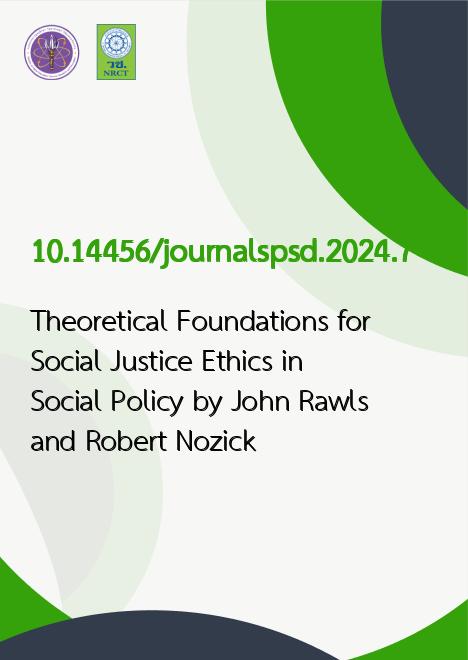
|
Theoretical Foundations for Social Justice Ethics in Social Policy by John Rawls and Robert Nozick |
|---|---|
| รหัสดีโอไอ | |
| Creator | Sukhuma Aroonjit |
| Title | Theoretical Foundations for Social Justice Ethics in Social Policy by John Rawls and Robert Nozick |
| Publisher | Faculty of Social Administration, Thammasat University |
| Publication Year | 2567 |
| Journal Title | Journal of Social Policy, Social Change and Development |
| Journal Vol. | 2 |
| Journal No. | 1 |
| Page no. | 19-30 |
| Keyword | Justice, John Rawls, Robert Nozick, Ethics, Social policy |
| URL Website | https://so10.tci-thaijo.org/index.php/journalspsd/issue/view/146 |
| Website title | Journal of Social Policy, Social Change and Development |
| ISSN | 2985-0800 |
| Abstract | The transformation of social welfare and social policies requires an understanding of the philosophical principles and fundamental concepts to guide the direction of social welfare and welfare policies toward the goal of social justice. This article aims to examine the intellectual concepts of justice as proposed by John Rawls and Robert Nozick. Comparative analysis was performed to reflect the differences and similarities of the two concepts. Rawls' conception represents the social democratic ideology, while Nozick's perspective represents the new libertarianism ideology. Utilizing document analysis, Rawls' principles of justice emphasize two central tenets: (1) the principle of equal fundamental liberties for all individuals and (2) the difference principle, which advocates for benefiting the least advantaged in society. Rawls' theory posits that societal inequalities can be rectified by redistributing economic benefits to the disadvantaged. On the other hand, Nozick's principles of justice include (1) the principle of just acquisition, stating that resources must be acquired fairly, and (2) the principle of just transfer, which entails voluntary exchanges without state intervention. Both ideologies prioritize individual liberties and oppose utilitarianism, emphasizing the importance of justice and its outcomes. These perspectives underscore the underlying philosophical foundations and divergent policy paradigms based on contrasting worldviews. |